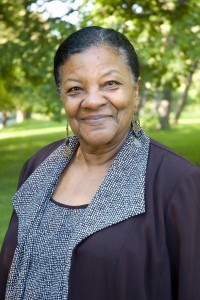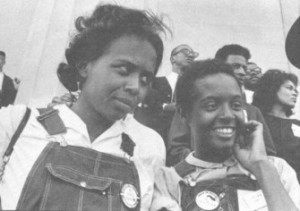Take a moment and think of some notable American female leaders…
Probably Alice Paul, Sojourner Truth, Elizabeth Blackwell, Eleanor Roosevelt, and Golda Meir are a few women that immediately come to mind.
Now take a moment and think of female leaders of the Civil Rights Movement…
Probably Rosa Parks, Coretta Scott King, Diane Nash, Daisy Bates and Fannie Lou Hamer are some of the first, most recognized names that come to mind. None have received the acclaim and recognition given to the male leaders of the movement.
In the spirit of MLK month and in honor of the female leaders who fought for equal rights for blacks, let’s add a gender sensitive perspective to this part of our nonviolent history by giving special recognition to just a few of the fearless women of the Civil Rights movement.
 One of influential leaders of the Civil Rights movement in Selma, Alabama. Colia initially got involved with the Civil Rights Movement through her work with the NAACP. As field secretary for the NAACP, Colia created the North Jackson NAACP Youth Council, known for initiating the 1963 mass movement in Jackson. She then joined Southern Conference Educational Fund (SCEF) and SNCC, where she moved to Selma as a field secretary with her then husband, Bernard Lafayette. There she created the Black Belt Alabama Voter Education Project, and was part of the Southern Organizing Committee in Nashville, Tennessee. She worked in coordination with Dr. Martin Luther King Jr. to create the Near West Side Union to End Slums Movement in the West Side First Ward.
One of influential leaders of the Civil Rights movement in Selma, Alabama. Colia initially got involved with the Civil Rights Movement through her work with the NAACP. As field secretary for the NAACP, Colia created the North Jackson NAACP Youth Council, known for initiating the 1963 mass movement in Jackson. She then joined Southern Conference Educational Fund (SCEF) and SNCC, where she moved to Selma as a field secretary with her then husband, Bernard Lafayette. There she created the Black Belt Alabama Voter Education Project, and was part of the Southern Organizing Committee in Nashville, Tennessee. She worked in coordination with Dr. Martin Luther King Jr. to create the Near West Side Union to End Slums Movement in the West Side First Ward.
Since her work in Selma, Alabama, Mrs. Clark has continued her work as an advocate. She created HUERA (Humanism, Unity Economy Rights and the Arts) where she conducts workshops in conflict resolution and mediation. She was a distinguished representative of the U.S. in the African Union conference. She is also the USA coordinator for the International Commission of Inquiry on Haiti.
In 1940, Ella was involved with the NAACP as a field secretary and director of branches. She co-founded In Friendship to raise money to fight against Jim Crow Laws in the deep South. She later moved to Atlanta, Georgia to organize the SCLC there in addition to creating the Crusade for Citizenship, a black voter registration campaign.
“The major job was getting people to understand that they had something within their power that they could use, and it could only be used if they understood what was happening and how group action could counter violence…” – Ella Jo Baker
Baker’s influence is best represented in her nickname, “Fundi”, a Swahili word meaning “a person who teaches a craft to the next generation.” After the Greensboro sit-ins, Ella left SCLC to train new student activists in Gandhian nonviolence and direct action. Her trainings at Shaw University would lead to the creation of the SNCC. With Ella, the SNCC helped organize the successful Freedom Summer project. Today, the Ella Baker Center in Oakland, CA continues her work in elevating racial and economic justice for people of color.
Joyce & Dorie Ladner
 Dorie and Joyce Ladner at the March on Washington, August 23, 1963
Dorie and Joyce Ladner at the March on Washington, August 23, 1963
In 1961, both Joyce and Dorie Ladner became involved with the Freedom Riders in Jackson, Mississippi and first introduced to nonviolent action. As field secretaries for SNCC, the Ladner sisters participated in the Woolworth’s lunch counter sit-ins, and organized various outreach programs and civil disobedience demonstrations aimed to register disenfranchised black voters and to end racially segregated public accommodations. Today, Dorie Ladner continues her organizing as a social and political activist against U.S. wars of aggression and been actively engaged in mobilization for a just U.S. policy in the Middle East. Joyce Ladner is a member of various civic engagement organizations, such as The Council on Foreign Relations, and the Washington Woman’s Forum.
Want to know more about the courageous women on the front lines of Selma, Alabama? Click below for links on a few more notable leaders.









